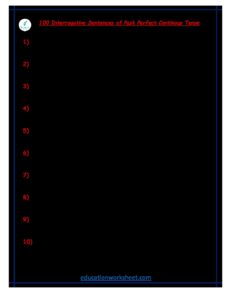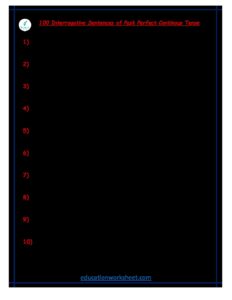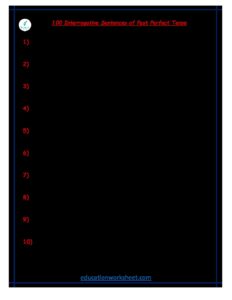Past Perfect Tense interrogative examples worksheets
Past Perfect Tense interrogative examples
Here’s a comprehensive description of the Past Perfect Tense in interrogative form, along with examples:
Past Perfect Tense in Interrogative Sentences
The Past Perfect Tense is a vital aspect of English grammar, particularly when constructing interrogative sentences to explore events or actions that happened before a specified past time. This tense emphasizes the sequencing of events and is formed by using the auxiliary verb “had” combined with the past participle of the main verb.
The general structure of an interrogative sentence in the Past Perfect Tense is as follows:
“Had + subject + past participle of the main verb + the rest of the sentence?”
Use of “Had”: The auxiliary verb “had” is the key component of the Past Perfect Tense interrogative questions. It indicates that the action or event took place before another past action or at a specific point in the past.
Subject: The subject of the sentence is usually placed immediately after “had.” This could be a pronoun (e.g., I, you, he, she, it, we, they) or a noun (e.g., John, the team, she, they).
Past Participle: The past participle of the main verb follows the subject. The past participle form of regular verbs typically ends in “-ed,” while irregular verbs have unique forms (e.g., eaten, taken, driven).
Rest of the Sentence: The rest of the sentence provides context and details about the action or event in question.
Examples:
Had he finished his homework before the party began?

-
- In this example, “had” is the auxiliary verb, “he” is the subject, “finished” is the past participle of the main verb, and the rest of the sentence inquires about the timing of homework completion in relation to the party.Had they ever visited Paris before they went on the European tour?
- “Had” is the auxiliary verb, “they” is the subject, “visited” is the past participle of the main verb, and the sentence explores their prior experience with visiting Paris.Had you eaten dinner by the time I called you last night?
- This sentence employs “had” as the auxiliary verb, “you” as the subject, “eaten” as the past participle, and it asks about the completion of dinner consumption in relation to the call last night.Had Sarah and Tom seen that movie before it won an award?
- Here, “had” is the auxiliary verb, “Sarah and Tom” are the subjects, “seen” is the past participle, and the question concerns their previous viewing of the movie before its award win.
Had the team arrived at the stadium before the heavy
rain started?
-

The auxiliary verb “had” is used, the subject is “the team,” “arrived” is the past participle, and the sentence investigates the timing of the team’s arrival in relation to the onset of heavy rain.Had it stopped snowing by the time you left for work this morning?
- In this example, “had” is the auxiliary verb, “it” is the subject, “stopped” is the past participle, and the question centers around the cessation of snowfall before the departure for work.Had Maria and Carlos completed their assignments before the deadline passed?
- “Had” functions as the auxiliary verb, “Maria and Carlos” are the subjects, “completed” is the past participle, and the query relates to their task completion in relation to the deadline.Had the company made the necessary changes to its policies before the regulatory audit took place?
- This sentence employs “had” as the auxiliary verb, “the company” as the subject, “made” as the past participle, and it inquires about the implementation of policy changes before the regulatory audit event.Had you ever traveled to Japan before your recent business trip?
- “Had” is the auxiliary verb, “you” is the subject, “traveled” is the past participle, and the question explores your prior experiences of traveling to Japan in the context of your recent business trip.Had the scientist discovered a new species of plant before publishing the research paper?
- In this instance, “had” is the auxiliary verb, “the scientist” is the subject, “discovered” is the past participle, and the question concerns the sequence of events leading to the publication of the research paper.
- “Had” is the auxiliary verb, “you” is the subject, “traveled” is the past participle, and the question explores your prior experiences of traveling to Japan in the context of your recent business trip.Had the scientist discovered a new species of plant before publishing the research paper?
- This sentence employs “had” as the auxiliary verb, “the company” as the subject, “made” as the past participle, and it inquires about the implementation of policy changes before the regulatory audit event.Had you ever traveled to Japan before your recent business trip?
- “Had” functions as the auxiliary verb, “Maria and Carlos” are the subjects, “completed” is the past participle, and the query relates to their task completion in relation to the deadline.Had the company made the necessary changes to its policies before the regulatory audit took place?
- In this example, “had” is the auxiliary verb, “it” is the subject, “stopped” is the past participle, and the question centers around the cessation of snowfall before the departure for work.Had Maria and Carlos completed their assignments before the deadline passed?
- Here, “had” is the auxiliary verb, “Sarah and Tom” are the subjects, “seen” is the past participle, and the question concerns their previous viewing of the movie before its award win.
- This sentence employs “had” as the auxiliary verb, “you” as the subject, “eaten” as the past participle, and it asks about the completion of dinner consumption in relation to the call last night.Had Sarah and Tom seen that movie before it won an award?
- “Had” is the auxiliary verb, “they” is the subject, “visited” is the past participle of the main verb, and the sentence explores their prior experience with visiting Paris.Had you eaten dinner by the time I called you last night?
- In this example, “had” is the auxiliary verb, “he” is the subject, “finished” is the past participle of the main verb, and the rest of the sentence inquires about the timing of homework completion in relation to the party.Had they ever visited Paris before they went on the European tour?
Past Perfect Tense interrogative examples worksheets

In summary, the Past Perfect Tense in interrogative sentences allows us to delve into the temporal relationships between past events. By using “had” and the past participle, we can construct questions that explore the occurrence of actions or events that transpired before other past occurrences, creating a rich narrative of the past. These questions facilitate a deeper understanding of the sequence of events and help convey the intricacies of past experiences and actions.

